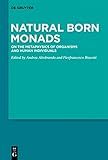Natural born monads : on the metaphysics of organisms and human individuals / edited by Andrea Altobrando and Pierfrancesco Biasetti.
Material type: TextLanguage: English Publication details: Berlin : De Gruyter, 2020.Description: vi, 337 p. ; 24 cmISBN:
TextLanguage: English Publication details: Berlin : De Gruyter, 2020.Description: vi, 337 p. ; 24 cmISBN: - 9783110602784
- 720.92 ALT
| Item type | Current library | Collection | Shelving location | Call number | Status | Barcode | |
|---|---|---|---|---|---|---|---|
 Reference
Reference
|
Kalaignar Centenary Library Madurai | ENGLISH-REFERENCE BOOKS | ஆறாம் தளம் / Sixth floor | 720.92 ALT (Browse shelf(Opens below)) | Not for loan | 132911 |
Browsing Kalaignar Centenary Library Madurai shelves, Shelving location: ஆறாம் தளம் / Sixth floor, Collection: ENGLISH-REFERENCE BOOKS Close shelf browser (Hides shelf browser)

|

|

|

|

|

|

|
||
| 720.92 ACT Gsd Platform 11: Setting The Table (P/B) | 720.92 AHM Bashirul Haq Architect | 720.92 ALL Ideas That Matter: The Worlds Of Jane Jacobs | 720.92 ALT Natural born monads : on the metaphysics of organisms and human individuals / | 720.92 AND Tmas: Dp Architects | 720.92 ANT Claesson Koivisto Rune Design Architecture (2 Vols Set) | 720.92 ANT Claesson Koivisto Rune Design Architecture (2 Vols Set) |
Includes index.
In this book, the authors explore a distinct intellectual trajectory that begins with Leibniz's concept of the monad in the 17th century, continues through the works of Kant and Hegel, and ultimately reaches Japan—the first Eastern country to engage with and challenge Western philosophy and sciences. This line of thought has since evolved into one of the central voices in contemporary debates within the philosophy of biology, philosophical anthropology, and social philosophy. The volume offers both a historical and systematic examination of a particular perspective on individuals and their environments, seeking to integrate their natural context with their dialectical nature. This historical and systematic approach provides a framework for assessing how the life sciences shape our understanding of individual lives, human activities, institutions, politics, and, ultimately, humanity as a whole.

